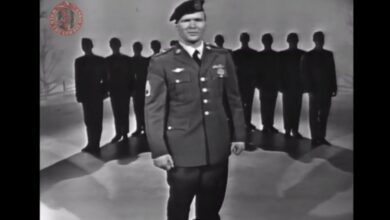Couldn’t Construct Sentences, Sang Oh, My. 46 Years Later, It Still Resonates.
Elvis Presley, born on January 8, 1935, in Tupelo, Mississippi, revolutionized popular music and created a cultural phenomenon that resonates to this day. Growing up in a struggling family, he was immersed in music from an early age, absorbing influences from gospel, blues, and country. His childhood experiences with church music and the rhythm and blues of Memphis helped forge his distinctive style, characterized by powerful vocals and emotional intensity. These formative years laid the groundwork for one of the most impactful careers in music history.
A significant turning point in Elvis’s career occurred in 1954 when he recorded “That’s All Right” at Sun Records. This track, which brilliantly fused various musical styles, quickly gained traction among fans and critics alike. It is often considered one of the earliest rock and roll records, showcasing Elvis’s talent for breaking through traditional musical boundaries. This debut single was not just a commercial triumph; it established him as a leading figure in a dynamic movement that would eventually redefine music and youth culture.
Elvis’s ascent to fame during the 1950s was nothing short of extraordinary. His unique vocal delivery and captivating stage presence entranced audiences across the nation. Signature hits like “Heartbreak Hotel,” “Hound Dog,” and “All Shook Up” further solidified his reputation as a superstar. His recording successes were complemented by vibrant live performances and television appearances, which broadened his appeal and introduced him to an eager audience. Shows such as “The Ed Sullivan Show” played a crucial role in amplifying his popularity, as millions tuned in to witness his thrilling performances, which highlighted not only his music but also his charmingly rebellious persona.
However, the relentless pressure of fame and public expectations began to take a toll on him. As his success soared, so did the demands on his time and energy. This overwhelming environment led him to seek refuge in prescription drugs and alcohol. His struggles with substance abuse became evident, particularly as the 1960s gave way to the 1970s. Despite facing significant health challenges, his commitment to his music and his loyal supporters remained steadfast. Many viewed him as a larger-than-life figure grappling with the vulnerabilities that accompany immense success.
During this tumultuous time, his personal life also experienced considerable turmoil, including his divorce from Priscilla Presley in 1973. This separation not only took an emotional toll but influenced his public image as well. Nonetheless, even amidst these challenges, Elvis maintained a strong connection with his audience. He continued to perform with passion, demonstrating the deep bond he shared with his fans. His dedication during live shows showcased music as a powerful outlet for expression and connection.
By the summer of 1977, the impact of his rigorous lifestyle and health issues became increasingly apparent. His final concerts were infused with a palpable sense of urgency and nostalgia, as he performed for devoted fans. Events in cities like Rapid City underscored the enduring quality of his artistry, even in the face of adversity. His heartfelt renditions of songs like “Are You Lonesome Tonight?” resonated with those present, proving that even in decline, the essence of his talent and passion remained vibrant.
Elvis’s death on August 16, 1977, sent shockwaves through the entertainment industry and beyond. It prompted an overwhelming outpouring of grief and tributes from fans and fellow artists. In the years that followed, it became evident that his influence was far from diminished. The songs he wrote and performed continued to inspire countless musicians, transcending generational divides through their timeless allure. His music inspired countless covers and reinterpretations, reflecting the universal themes of love, heartache, and resilience inherent in the human experience.
The legacy of Elvis Presley is intricate, intertwining themes of triumph and tragedy. It serves as a reminder of the heavy toll fame can exact on an individual while simultaneously highlighting the beauty of artistic expression. His life exemplifies the contradictions of celebrity—bringing joy to millions while wrestling with personal demons—unveiling a profound truth about the nature of fame. Elvis, in all his complexities, embodied the quintessential journey of the artist: the search for identity and connection amid the noise of public life.
Celebrations of Elvis’s life and contributions abound through music festivals, tribute concerts, and various artistic endeavors. His story continues to captivate new generations who discover his remarkable catalog. As scholars, fans, and artists delve into his music, the conversations surrounding his cultural impact deepen. The narratives shared about his life illustrate how music serves as a universal language, uniting individuals across time and space.
Ultimately, Elvis Presley’s journey illustrates the profound bond between artist and audience, a connection that transcends the boundaries of individual existence. His artistry continues to resonate deeply with those who find comfort and joy in his music. Through shared stories and the lasting impact of his work, the spirit of Elvis lives on as a powerful symbol of creativity, resilience, and the unbreakable ties formed through music. His legacy not only celebrates his extraordinary talent but also offers reflections on the complexities of human experience and the enduring pursuit of belonging.





